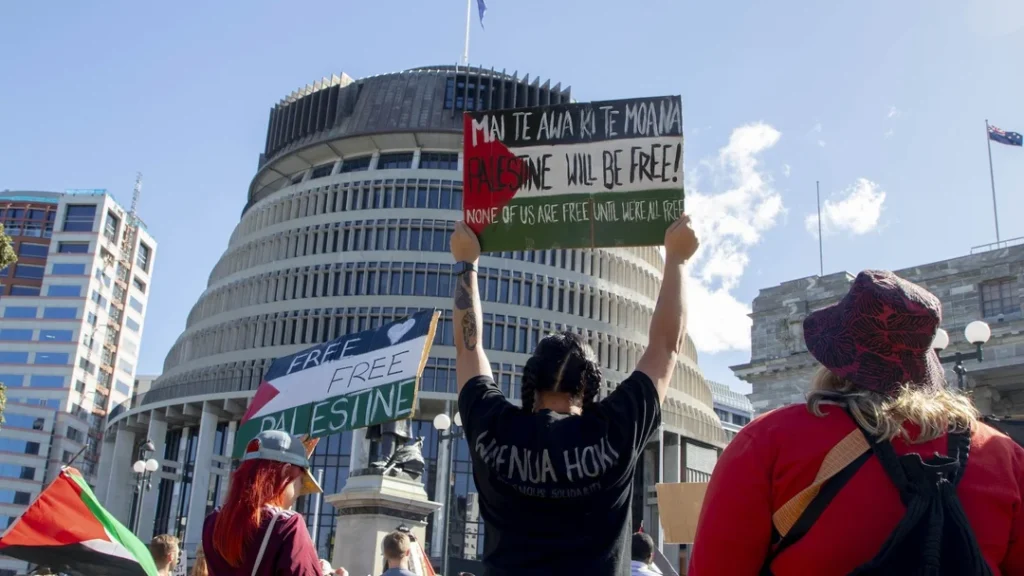Australia/Israel Review
AIR New Zealand: What October 7 exposed
Sep 23, 2024 | Miriam Bell

It’s been one year since the horrors of October 7, and in that time New Zealand’s small Jewish community has been changed irrevocably. A long-held sense of security has been severely shaken.
At the time of the Hamas terror attacks on Israel, New Zealand was nearing the end of a testy election campaign, while the election which took place a week later resulted in six weeks of negotiations before a new coalition government was formed.
This created something of a limbo, whereby those nominally in power, or coming into power, were reluctant to state a position on anything significant – including October 7 and its aftermath.
While the two largest political parties, National and Labour, condemned the Hamas attacks, they said little else. That silence had an impact, and many civil leaders and organisations followed suit. Surprisingly few overtly expressed sympathy for Israel or the Jewish community.
But others rushed into the breach. Long-time anti-Israel campaigner John Minto claimed within days that Israel had brought October 7 onto itself, and he was not alone. This trend has continued ever since.
Perhaps the most notable early example of where this could lead was the debacle which unfolded at the Auckland War Memorial Museum the week after the attacks.
In common with many landmarks around the world, the museum lit up its exterior in blue and white in solidarity with Israel. As at other such events, pro-Palestinian protestors, spouting antisemitic rhetoric, turned up.
But, uniquely, the next day the Museum’s Chief Executive issued an apology for “the distress and hurt caused to members of our community” by the lights.
The Jewish community was appalled, with NZ Jewish Council spokesperson Juliet Moses describing it as a “betrayal”. But the Museum, which is home to a Holocaust gallery, would not acknowledge the hurt felt by the Jewish community.
It led to the Holocaust Remembrance Day commemorations traditionally held at the Museum being hosted elsewhere. And while the Holocaust Centre of New Zealand has been working with the Museum to find a way forward, to date no solution has been reached.
Once Israel embarked on its military campaign in Gaza, the environment grew worse. The Green Party and Te Pati Maori party have been actively anti-Israel, and regularly accuse Israel of colonialism, apartheid and genocide.
Green Party MP Chloe Swarbrick, who is now its co-leader, has appeared at pro-Palestinian rallies and led chants of “from the river to the sea.”
On top of ongoing pro-Palestinian demonstrations, Palestinian flags and signage have become common features at other political protests, including marches on environmental and Maori rights issues.
Anti-Israel and anti-Zionist graffiti and stickers are commonplace, synagogues have been defaced and forced to close for security reasons and Jewish community leaders have been abused.
Halal Kiwi, an app and website, created a “boycott list” of 300 brands and businesses that it claimed were supporters of Israel or had connections to “Zionism”.
Mindful Money, a charity promoting ethical investment, has been calling on fund managers to divest from companies “enabling illegal Israeli settlements in Palestine and weapons used in Gaza.”
Recently, a complaint over an artwork by a Jewish artist featured in a Multicultural Services Trust’s “celebration of diversity” led to controversy and the work, along with a Palestinian artwork, being removed.
Meanwhile, antisemitism has skyrocketed. At a recent Holocaust Centre briefing, the board’s Chair, Deb Hart, reported 80% of respondents to a survey run by the Centre in July said their children had suffered antisemitic episodes in their schools.
Additionally, even before October 7, police crime statistics showed a 530% increase in the targeting of Jews in 2022-2023, and that Jewish New Zealanders were 160 times more likely to be the victim of a hate crime than Maori New Zealanders, Hart said.
That has led her to call on the Government to appoint a special envoy to combat antisemitism.
Since October 7, Rob Berg from the Jewish National Fund NZ has organised regular vigils and marches for the hostages. He said that when reflecting on the last year, two things came to mind.
The first was that the levels of antisemitism seen in New Zealand, as well as globally, has been a surprise. “It’s like a sleeping poisonous snake has been awoken,” he said.
“Being at an anti-Israel rally in Wellington earlier this year to observe what was being said, felt like I was at a Nazi rally with people just repeating slogans from the speakers without giving any thought to what they actually meant – or maybe I am being naive and they knew exactly what they were saying.”
But a second, more positive observation was that October 7 had brought the Jewish and Israeli communities closer than he had seen in the past. “October 7 has unified us more than ever before,” he said.
Tags: Antisemitism, Israel, New Zealand






